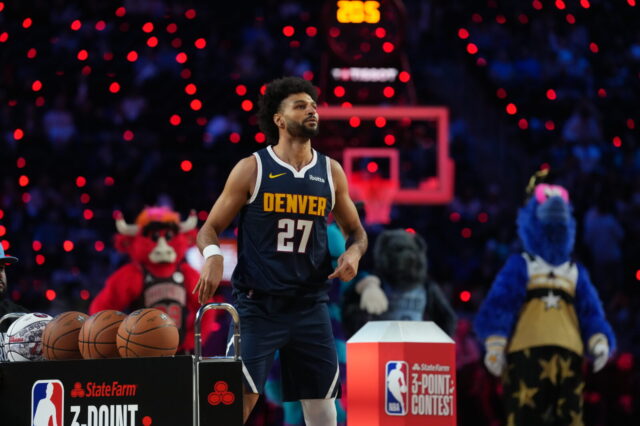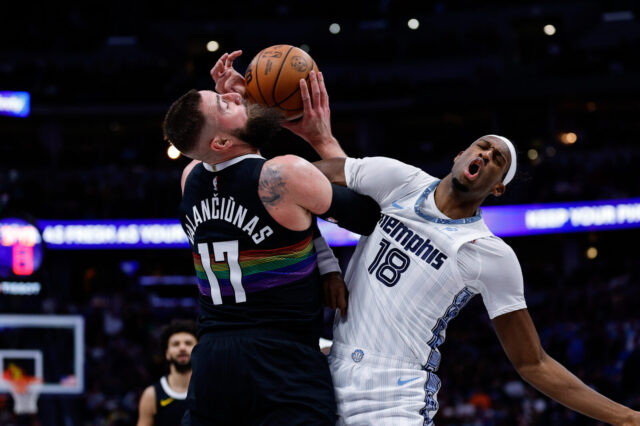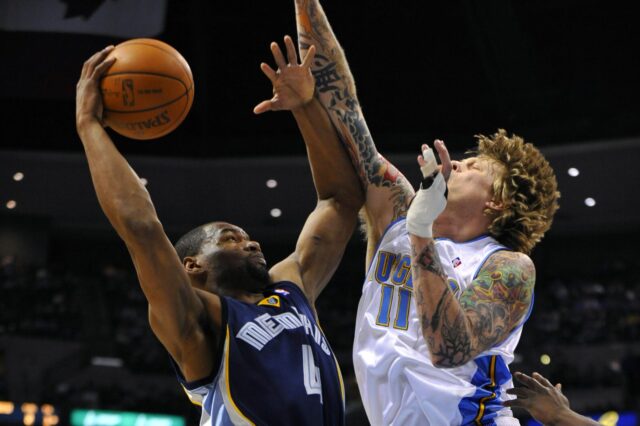The Denver Nuggets might be looking for a replacement in the near future for 37 year-old Andre Miller. On June 27th the team drafted Erick Green, a senior, out of Virginia Tech with the 46th pick and added seniors Ramon Galloway, La Salle, and CJ Harris, Wake Forest to their Summer League roster (July 12-22). All three of those guys are point guards that can shoot the three.
I wanted to find out a little more about Green's game. What better way to do so than to bring in Chris Hatcher from Gobbler Country – SB Nation's V-Tech site – to talk about Denver's newest Nugget.
Nate Timmons: Virginia Tech went 13-19 last season (4-14 in the ACC). What do you attribute the lack of success to and where does Erick Green come into play in that?
Chris Hatcher: Yeah, it was a disappointing season for sure, even with lowered expectations after the firing (or rather shit-canning, can I say shit-canning?) of former head coach Seth Greenberg following the 2011-12 season. The firing led to two players/recruits who had signed letters of intent leaving the program (the two highest-rated prospects). I predicted the Hokies would win 10-15 games in the preseason, so they were well within that range.
The lack of success could be attributed to many things, but none of them Green. I know that in most cases where the nation's leading-scorer played on a losing team (and I can't think of many cases of that being the case) a blanket statement could be issued to absolve him of blame. But honestly, he left it all out on the court (literally). He wasn't a selfish player. He passed. He tried to get his teammates involved, but they weren't much help.
I think that the installation of the more fast-paced offense, that saw the Hokies shoot out to 7-0 record, was both a blessing and a curse. It made Tech hard to beat in the early going, against admittedly inferior opponents, but in the end it was the cause of their demise. You can't run up and down the floor for 40 minutes a game with just seven or eight scholarship bodies. They tried and they ran out of gas. It was obvious too. It started in their defense and soon thereafter manifested itself in their shooting as well, taking both poor quality shots and not having their legs. It all kind of just fell apart from there when they lost freshman and sixth man Marshall Wood to a broken foot for a month. Really it was a tale of two different basketball teams, and unless Green had a crazy-good night (30+ points), the Hokies were rarely competitive from that point on.
Timmons: Just looking at Green's numbers from a distributor's standpoint – 3.8 assists doesn't bowl anybody over – how are his passing skills?
Hatcher: His assist numbers for a point guard who played as much as he did are just marginal, that is inarguable. But I would posit first off that you're unlikely to ever find a guy who leads the nation in scoring have a very high assist total. And in fact, I would expect a player like that to have a negative assist-to-turnover ratio or at least be a turnover machine. But Green did neither of those things, posting nearly a 2-to-1 assist-to-turnover rate both last year and for his entire career.
For someone with the usage rate that he had, 69 turnovers in in 32 games is not only very good, it’s unreal. It just doesn’t happen. Which is one of the reasons why he was fifth in the nation in offensive efficiency, per Ken Pomeroy’s ratings, and the ninth-ranked player all-time in college basketball in player efficiency rating (or PER) since it’s been applied.
That just doesn’t happen for a volume shooter, which Green was not. He put up a lot of shots, yes, but he wasn’t the Jamal Crawford or J.R. Smith model who just fired away at will. In fact, according to a link from this Mike Prada scouting report on him, Green averaged “the fewest shot attempts for the country’s leading scorer since Kevin Granger of Texas Southern in 1995-96.”
Green's passing ability is also very underrated. He's a good case study in why you can't measure court vision by assists (he averaged just 3.8 per game last season). To get an assist, the receiver must finish the play, and the Hokies failed Green in that regard so many times this season. Two glaring examples:
I think he makes the smart passes, which would explain his lower assist low-turnover totals. As I think I said on your boards, maybe he doesn’t make the extravagant passes that maybe a Rajon Rondo or a Chris Paul would make, but he also doesn’t commit as many turnovers because he’s not trying to make those passes. I think he definitely profiles as more of a point guard than a shooting guard, so I wouldn’t worry too much about his passing. He’s a willing passer and he makes good passes.
Timmons: Give us a sense of what Green means to the Hokie fans. Is he a beloved player? Will he be remembered there? And what are your impressions of him as a teammate and a leader?
Hatcher: For those of us who paid attention (which is actually quite a bit of an issue as of late for Virginia Tech basketball), Green will be remembered among the best four or five players who ever suited up at V-Tech. He's firmly entrenched in the top-10 for sure. His legacy to some will be a great player who played on some losing teams, but in reality, he also played on the best basketball team in school history, a team that won 23 regular season/conference tournament games in 2009-10, even if he was lost as a freshman.
As far as being a teammate and a leader, I think he was an excellent teammate. He was once benched for a half (if I remember correctly) as a junior because former coach Greenberg thought he wasn't working hard enough or thought he was acting entitled. But otherwise, he never made any ripples in the locker room.
As a leader, it was harder to see until later in his sophomore year when he became more of a featured player. But then again he was playing on a team with three starters who had started for a combined 11 years. So it's easy to see why he would defer to them. It was absolutely Malcolm Delaney's team, and nobody questioned that. But Green, when he took over, was a much more subdued and low key leader. It was his team, and nobody questioned that, but he wasn't as vocal, though you did often see him encouraging teammates and he would organize the team huddle. I think that's just his nature to be a more of a lead by example guy.
There are two Green moments that most Tech fans will remember him for.
The first, happened as a sophomore in the ACC Tournament against Florida State, just as he was blossoming. Tech was down 1 point in the waning seconds of the game. Green had struggled that game, going 1-12 from the field and 0-4 from deep, but Delaney got caught up on the baseline underneath the basket with just a few seconds remaining. He threw a pretty ill-advised pass to Green, instead of the wide open Manny Atkins. Green, calmly caught the ball, set and released from right inside the arc as a Florida State player made a good contest. The shot swished and gave the Hokies the lead. Florida State of course raced down to the other end of the floor and Michael Snaer hit a nasty shot at the buzzer over a tough Green contest. Green looked dejected, one of only six Hokies who had played in the game. He had given it his all and now this?
The loss would keep the Hokies out of the tournament for the fourth consecutive year (they only needed one more win to perhaps put them over the NCAA tournament bubble). The FSU buzzer-beater was reviewed, it was determined the ball was still in Snaer’s hand at the buzzer, and the shot was waved off – Tech wins. The team dog-piled on Green. It was a moment of pure bliss, for Tech fans who finally thought they had exacted their demons with the tournament selection committee and would be in, but alas they were snubbed, again.
Here is Green’s game winner in the ACC tournament against FSU.
The second, came this past season, when after the final horn sounded in a loss home loss to Georgia Tech, 64-54, Green had to be carried off the floor by his teammates because he was so exhausted. His stat-line that game: 35 minutes played, 28 points on 9-20 shooting – 2-5 from deep, 8-9 from the foul line – with 3 assists, 2 turnovers, 2 blocks and 1 steal. Tech’s play-by-play announcer posited carrying Green from the floor might have been the most help they had given him in months. So even in a loss, we’ll always remember that effort.
Timmons: How do you think his game will translate at the NBA level? What are some of his weaknesses and what are his biggest strengths?
Hatcher: I think Green will have to make some adjustments, but that his game will translate to the NBA level. In the NBA, the offenses are predicated on more ball movement and plays and less isolation and clear-outs. Therefore, Green isn't going to get the kind of treatment he got in college. He's going to have to go back to playing in an offense where not only might he not be the only offensive threat, but he might not be the best one. I think his shot will be fine. He should be able to produce there from the outset. But dealing with how he's going to be defended in the NBA, which is more physical and tighter (if that's even possible), is big for him. In that respect, this past season may have helped immeasurably. But I don't expect him to jump right in and be an All-Star right away.
As you can see by looking at his year-to-year stats at Virginia Tech, Green got better by large strides every year, unlike former Hokie Malcolm Delaney, who basically left as the same player he came in as for whatever reason. I think by the end of their careers that Green was a better player, even if he didn't have quite as good of a career as Delaney did.
I'd expect the same kind of improvement from Green until he hits his prime in the NBA as well. Again, I think he'll score right away and be an effective second unit player, but beyond that it's too hard to tell. His weaknesses are his defense – as he is just an average defender and prone to some mental mistakes there. He did, at times, lose track of his guy or get caught in a screen and be unable to fight through it. That part is also probably related to his other major weakness right now, which is his strength and build.
I think he can add a few pounds, but he's basically been that way for his entire life. It'll be interesting to see what he can do going forward, but I would be excited to see how he develops and what all he can do for you guys.
Congratulations for being able to get him at 46. In my admittedly-biased opinion, you guys got a steal.
Nate_Timmons on Twitter
ntimmons73@yahoo.com


